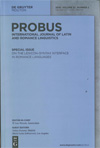PROBUS.International Journal of Latin and Romance Linguistics
The present collection of papers aims to illustrate the contribution of Romance linguistics to the study of event and argument structure in a diverse set of core syntactic constructions, such as the dative and locative alternations, the directed motion and resultative forms, as well as the causative, anti-causative/inchoative, and conative constructions. With their rich clitic systems and their principled and systematic differences with Germanic, the Romance languages provide a unique window into the complex interaction between the meaning of verbal stems and the syntactic form (as encoded in the (semi) closed class vocabulary of the grammar), and sheds light on their respective contributions to the propositional content of the sentence. Research into the lexicon-syntax interface in the last decade has shifted its explanatory power from the lexicon to the syntax, thus clarifying the role of functional categories while constraining the form of syntactic mechanisms. The articles in this volume provide further support for this new perspective. Yet, the import of the lexical meaning of open class items (even in its most minimal sense) and its relation to the meaning contributed by the construction itself to the overall interpretation of the sentence continue to be ongoing topics of debate. This volume also partakes of this debate.
Editor-in-Chief: W. LEO WETZELS
Co-Editors: Rafael Núñez-Cedeño and Jairo Nunes Editorial Assistant: Jeroen van de Weijer
Approx. 300 pages per volume, two issues per volume
ISSN (Print) 0921-4771
ISSN (Online) 1613-4079
Ed.: Violeta Demonte (ILLA-CCHS)
Portada del libro454.47 KB

Cambio, variación y cognición en el lenguaje (*)



